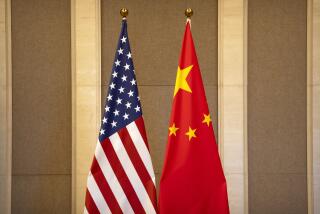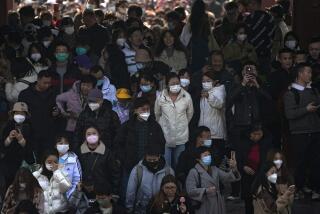China Admits Neutron Bomb-Building Capability
- Share via
BEIJING — China publicly confirmed Thursday what international security experts have known for years: that it possesses the technology to build a neutron bomb.
The Chinese government said its scientists developed the know-how during the 1970s and ‘80s, when the Cold War escalated between the U.S. and Soviet Union. China exploded a neutron bomb in 1988--a fact widely known among intelligence experts around the world--but never openly acknowledged its capabilities.
Official confirmation came Thursday with the release of a detailed rebuttal of the Cox report, the recent U.S. congressional investigation that alleged widespread Chinese espionage and theft of U.S. military technology, including the capability to produce a neutron bomb.
Since the Cox report was published, Chinese officials have insisted that their nuclear scientists are capable of doing their own research and do not need to steal U.S. military secrets. Much of the information China is accused of pilfering is available in scientific journals and on the Internet, Chinese and Western experts have pointed out.
The neutron bomb, which kills through enhanced radiation without heavily damaging buildings, is a modified version of the hydrogen bomb, which China first built and tested in the late 1960s.
Since China already had the technology to build the hydrogen bomb, it was “quite logical and natural for [China] to master neutron bomb technology through its own efforts over a short period of time,” government spokesman Zhao Qizheng told a news conference Thursday.
Zhao issued a lengthy, eight-part response to the Cox report full of technical explanations of how China developed its own military technology, including the ability to miniaturize warheads and to improve antisubmarine capabilities.
In a telephone interview, Rep. Christopher Cox (R-Newport Beach), author of the congressional report, said the Chinese denial of nuclear espionage “is to be expected.” The Chinese authorities didn’t “provide any evidence to back up any denials,” he added.
China is not alone in criticizing the Cox report. A growing number of U.S. scientists, weapons experts and others have raised doubts about several of the report’s key assertions since its release May 25.
In an editorial published this week in Arms Control Today, the journal of the independent, Washington-based Arms Control Assn., executive director Spurgeon M. Keeny Jr. argued that the Cox report uses “little evidence and flawed logic” to “hype a new Chinese nuclear missile threat.”
Wolfgang K.H. Panofsky, director emeritus of the Stanford Linear Accelerator Center in California, declared in the same journal that “many of the technical facts” cited in the Cox report “are simply wrong: dates of events, payloads and dimensions are inaccurate.”
“I think the present spy hysteria is totally unjustified,” Panofsky said Thursday. “I think the actual loss, if there was one, is minor in terms of military significance.”
Much of the Chinese rebuttal to the Cox report repeats earlier responses, leading some analysts to wonder why Beijing chose to issue the report just as Sino-U.S. relations have begun showing signs of recovery after NATO’s accidental bombing in May of the Chinese Embassy in Yugoslavia. A U.S. delegation charged with negotiating reparations arrived in Beijing on Wednesday.
“Now is not the time for prideful rebuttals,” said James Mulvenon, an expert on the Chinese military at Rand Corp. in Washington. “There was clear Chinese signaling that they wanted to renormalize [ties]. So why would they want to screw that up with this screed?”
Beijing’s announcement also comes as tensions are flaring up with Taiwan, which China considers a breakaway province. Taiwanese President Lee Teng-hui infuriated Beijing over the weekend by saying Taiwan should be viewed as on par with China as a separate state.
Chinese Defense Minister Gen. Chi Haotian on Wednesday warned Taiwan that the mainland’s military remains ready to “smash any attempts to separate the country,” the official New China News Agency reported.
The rebuttal to the Cox report provided a rare glimpse into China’s nuclear weapons research program, which the government normally keeps secret. The rebuttal named domestic scientists and gave dates of the various advances China says it made over the years.
Chu reported from Beijing and Drogin from Washington.
More to Read
Sign up for Essential California
The most important California stories and recommendations in your inbox every morning.
You may occasionally receive promotional content from the Los Angeles Times.















